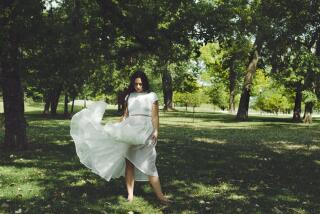Diverse Acoustic Styles Mark McCutcheon’s Musical Talent
- Share via
SAN DIEGO — A critic for the Washington Post once referred to acoustic-music star John McCutcheon as “a Virginia rustic Renaissance man.” The description is accurate but begs qualification: Unlike those musical jacks-of-all-trades whose diversity melds thin layers of mere competence or, at worst, mediocrity, the 38-year-old McCutcheon has mastered most of his undertakings.
A skilled instrumentalist, McCutcheon accompanies himself on acoustic and electric guitar, as well as on fiddle, banjo and piano.
But he is perhaps better known as one of the preeminent proponents of the hammered dulcimer, a zitherlike instrument that, when played with feather-light wooden mallets (hammers), produces a sweet, delicate tone--like snowflakes falling on strings.
McCutcheon’s stylistic range traces a wide arc from contemporary pop-folk to traditional Appalachian music, from topical songs with penetrating lyrics and modern production values to winsome instrumentals on age-old instruments. His work embraces disparate categories, even as he defies their individual limitations.
McCutcheon is so widely respected in acoustic circles that today’s 8 p.m. concert at the Del Mar Shores Auditorium is likely to sell out, even though the average music fan might shrug at the mention of his name.
The show, a presentation of the San Diego Folk Heritage organization, undoubtedly will convene many of McCutcheon’s multiple personalities: folklorist, raconteur, singer, teacher, political activist, dance caller.
Such breadth is well chronicled on McCutcheon’s last two albums, 1988’s “Gonna Rise Again” and the current “What It’s Like.” The latter opens with the comfortably familiar strains of a guitar ballad, “Cup of Coffee,” sung from the perspective of a middle-age man contemplating life’s treadmill vis-a-vis his long-evolving love for a woman.
The vaguely anomalous presence of a saxophone, however, introduces a decidedly non-folk element to the mix, and foreshadows an eclecticism that encompasses the employment of Third World percussion, synthesizers, Uilleann pipes and whistles, fiddle, a poplike rhythm section of bass and drums, and, of course, hammered dulcimer.
That variety of instrumentation is a studio luxury that McCutcheon transfers to the stage only occasionally when performing with friends in the Washington area.
When he tours, his shows are, by his own account, “99 and nine-tenths percent solo,” as tonight’s concert will be. And, though he would enjoy hearing his musical ideas fleshed out in performance, McCutcheon allows that the one-man show offers its own satisfaction.
“There’s a different dynamic at work when you perform solo,” he said moments after arriving in San Diego on Thursday afternoon. “Rather than other musicians providing balance, the audience does. They become the other half of the equation in a way that isn’t possible when you perform as an ensemble. Also, it’s easier to communicate certain ideas when it’s just you and the audience.”
Those ideas are the philosophical core of McCutcheon’s work. He sometimes seems like a one-man life-support system for issues that tend to get swept aside in the hot tide of current events.
On “What It’s Like,” the precarious situations faced daily by farmers (“Ask Any Farmer”), fishermen (“The Silver Run”), factory workers (“Know When to Move”), and indigents (“Room Here for Another”) are given a sensitive, literary-narrative treatment that delivers a strong message free of bludgeoning didacticism.
And, though the music that carries his sentiments is uniformly well-crafted--often beautiful--McCutcheon’s points of view remain a recognized hindrance when it comes to getting his music heard.
“I refuse to sanitize my politics in order to gain airplay on radio stations,” he said. “That’s one reason why my music has so far been heard mostly on public radio and the like. But I would love to have more people hear my songs, especially the people for and about whom they’re written.”
McCutcheon acknowledged that his use of certain kinds of instrumentation and production is a conscious effort to break down the barriers that artists like him face.
“Sometimes, I feel that I’m progressing in that regard,” he said. “But, ironically, some obstacles come out of left field. A friend of mine called from Dallas to tell me he heard ‘Cup of Coffee’ on the radio. He said if the sax part had instead been a pedal-steel guitar, I’d have a big hit down there. I told him I like the sound of the saxophone better!”
Some folk-music purists, too, occasionally balk at McCutcheon’s benign stubborn streak, but he claims it is integral to his work ethic.
“For the most part, I never tailor my music to please a particular clientele because I’m too interested in introducing all sorts of different sounds,” he said.
“I have people come up to me sometimes and say things like, ‘I liked you better in the days when you just played fiddle and banjo tunes,’ ” McCutcheon said. “But my career just isn’t linear. My next album will be a live recording, then the one after that is a children’s album, then I might do a project with an acoustic string band.”
His brand of iconoclasm also extends to the hammered dulcimer. Many players approach it as a string instrument that you intone with hammers. Not McCutcheon.
“When I was a kid, I was constantly beating on tables with pencils and whatever,” he said. “I guess there was a percussionist in me trying to break out. Even today, when I play at music festivals, I tend to gravitate toward the percussionists.
“When I began playing the hammered dulcimer about 15 or 20 years ago, I approached it as a percussion instrument, and I still play it as though it were a combination steel drum and marimba. But it satisfies my string orientation, too. Of all the instruments I play, I feel the most freewheeling on the hammered dulcimer. I guess that explains my unusual style.”
More to Read
The biggest entertainment stories
Get our big stories about Hollywood, film, television, music, arts, culture and more right in your inbox as soon as they publish.
You may occasionally receive promotional content from the Los Angeles Times.








